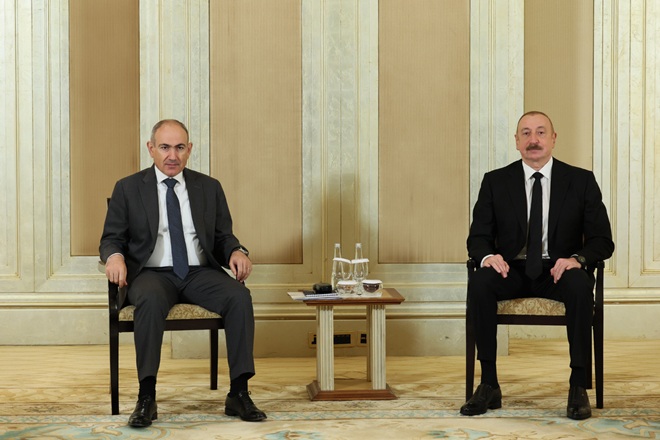
Donald Trump claimed he solved the Armenia-Azerbaijan conflict. He even credited his administration with ending the long-standing standoff between Baku and Yerevan. While that claim is debatable, it exposes a more profound shift that is underway in the South Caucasus.
By Farid Shukurlu
When empires lose the respect of former colonies where they once thrived on division, peace becomes possible through mutual understanding. With Russia and Iran’s influence waning, and no external mediators in sight, Azerbaijan and Armenia are now steering their future through pragmatic cooperation and strategic integration.
What was once unthinkable is now a symbol of post-imperial geopolitics driven by regional will, not foreign interests.
Following the unprecedented military success of Azerbaijan against Armenian separatists in 2020 and 2023, a new reality emerged in the region. The South Caucasus is no longer Russia’s playground, as its strategy of double-leverage over the conflicting sides has now been neglected, rejected, and ultimately ignored.
On one hand, Armenia, once seen as a Russian outpost positioned to keep Turkey and Azerbaijan in check, has been forced to abandon its staunchly pro-Russian stance and instead diversify its security cooperation, seeking concrete security guarantees from countries such as France, India, and Greece.
On the other hand, Baku did what was expected of it—brokering a formal military alliance with Ankara through the signing of the “Shusha Declaration”, while also enhancing its strategic military cooperation with Jerusalem and Islamabad.
Despite criticism from the Russian and Iranian capitals, who have struggled to accept Ankara’s growing influence in the region, Baku continues to strengthen its security and military ties with them and other Turkic states. Notably, President Aliyev reaffirmed in his inauguration speech that Azerbaijan’s future lies with the Turkic world, declaring, “our family is the Turkic world, and this is where we feel ourselves well.”
The Peace Treaty
On July 10, 2025, Armenian Prime Minister Nikol Pashinyan and Azerbaijani President Ilham Aliyev met in Abu Dhabi for the first official bilateral talks since the two leaders had signed a peace framework earlier this year. The negotiations were hosted by UAE President Sheikh Mohamed bin Zayed Al Nahyan (MBZ) and were described as constructive and working towards driving the peace process forward.
Both leaders reiterated their mutual commitment to direct negotiations and agreed to pursue confidence-building measures through tangible steps. Key issues on the agenda included border demarcation, regional transport routes, and finalising the framework of the peace agreement.
One of the most decisive factors enabling progress in the Armenia–Azerbaijan peace process has been the weakening of Russia’s regional influence. As French historian Maxime Gauin argues, Moscow’s fading grip has allowed a more balanced and independent dynamic to emerge between the two neighbours.
Key diplomatic milestones reflect this shift, Gauin elaborated: "The Prague Declaration, in which both sides recognised each other’s territorial integrity, was signed in October 2022 during Ukraine’s successful counter-offensive. This marked the first significant step forward since the 2020 ceasefire."
In 2024, Armenian Prime Minister Nikol Pashinyan returned four villages outside Karabakh, shortly after Russia’s border guards lost control of Erevan’s airport, making a clear sign of Armenia distancing itself from Moscow. That same year, and into 2025, border demarcation efforts advanced significantly, confirmed in the most recent meeting between the leaders.
Gauin contends that the less Armenia feels threatened by Russia, the more it embraces peace. "Russia’s declining leverage stems from real losses: massive military casualties, depleted weapons stockpiles, and the exhaustion of its National Wealth Fund."
In this new geopolitical reality, Armenia is stepping out of Russia’s shadow, creating space for direct, pragmatic diplomacy based on shared interests with Azerbaijan, which now also views Russia as a hostile power.
The Zangezur Corridor
One of the key obstacles in the peace process is the Zangezur Corridor. Still, recent developments indicate a positive shift towards opening this vital transport route, marking a significant turning point in the geopolitical landscape of the South Caucasus. It connects Azerbaijan to its exclave Nakhchivan through Armenia’s Syunik region (Western Zangezur), raising both strategic hopes and regional tensions.
For Azerbaijan, the corridor is of critical importance, resembling an “oxygen pipe” that would end Nakhchivan’s isolation and establish a direct land connection to Türkiye. Beyond its economic and strategic significance, the route would also serve as a vital link in uniting the Turkic world, strengthening regional integration and solidarity among Turkic nations while reducing reliance on transit through Iran.
The establishment of the Zangezur Corridor has been one of the most contentious issues since the 2020 ceasefire. Azerbaijan has consistently demanded unhindered access through the corridor, viewing it as essential for national connectivity and regional integration. In contrast, Erevan has firmly insisted on maintaining full Armenian sovereignty over the route, rejecting any form of extraterritorial control.
However, this deadlock appears to have been broken. Ambassador Tom Barrack now suggests that the United States is prepared to assume administrative oversight of the Zangezur Corridor. This arrangement could pave the way for a long-awaited breakthrough. Crucially, this development seems to be based on the mutual consent of both the Azerbaijani and Armenian governments, who view increased American involvement as a stabilising force in the region.
Such a move could not only resolve one of the most deep-rooted disputes between the two countries but also open the door to broader diplomatic progress, including the potential integration of both nations into the Abraham Accords, further strengthening regional cooperation and peace.
The proposal to place the Zangezur Corridor under the administration of a neutral US-based logistics firm could also help alleviate Iran’s objections, which have been among the most vocal and forceful in the region. Iranian officials have repeatedly described the corridor as a strategic “red line,” viewing it as a threat to their geopolitical influence, direct access to Armenia, and broader regional connectivity.
It is no secret that Iran views Azerbaijan as both an ideological and geopolitical threat to the Islamic Revolution. This perception stems from Baku’s carefully constructed alliances with Türkiye—a leading Sunni power and NATO member—and Israel, the world’s only Jewish state. In Tehran’s eyes, these partnerships directly challenge Iran’s regional influence and its vision of a Shia-led axis.
Against this backdrop, the proposed involvement of the United States in overseeing the Zangezur Corridor could act as a stabilising force, offering greater security guarantees not only to Azerbaijan but also to Erevan. Both parties increasingly seek to reduce their dependency on Moscow and Tehran, and American participation signals a broader strategic reorientation—one that aligns with Western-backed frameworks and counters the entrenched influence of Iran and Russia in the South Caucasus.
Western Azerbaijan
The right of return for Western Azerbaijanis who were forcibly deported from present-day Armenian territory remains a central pillar of Azerbaijan’s foreign policy. This issue prompted the establishment of the Western Azerbaijan Community in Baku, which advocates for the rights of refugees displaced from their ancestral homeland.
Despite its scale and historical significance, this remains one of the most overlooked human rights crises of the 21st century, receiving far too little attention in academic and international discourse.
Human rights are universal, and Western Azerbaijanis are calling on the international community to uphold this principle in their case. The signing of the peace treaty marks a historic milestone, with reports suggesting that the issue of their right to return was also raised during discussions in Abu Dhabi.
Nonetheless, some Armenian diaspora groups and media outlets have misrepresented this as a territorial claim; an interpretation that does not reflect the reality. At its core, this is a human rights issue that deserves international recognition and support.
Galib Gasimov, Head of Administration of the Western Azerbaijan Community, firmly states that the baseless claims surrounding the Community’s mission and objectives have now been debunked through documented evidence and legal reasoning.
He explains that the Community was established on the foundation of the Azerbaijan Refugees Society, which began its work in 1989 in response to the forced deportation of nearly 300,000 Azerbaijanis from present-day Armenia between 1987 and 1991. By 2022, there was a clear need to modernise the organisation to address current challenges, leading to its restructuring and renaming as the Western Azerbaijan Community.
Galib Gasimov noted that the Community remains the sole public body preserving accurate records of those events, with detailed documentation on over 20,000 families and nearly 300 localities from which Azerbaijanis were expelled.
He underlined that the Community has adopted the concept of “Right to Return"—a strategic framework based on international law, domestic legislation, and historical facts—aimed at ensuring the peaceful, safe, and dignified return of Azerbaijanis to their ancestral lands.
“The Community does not accept the injustices committed over the past two centuries and is committed to securing the individual and collective rights of the displaced population. For the past three years, we have worked to raise international awareness and inform the Azerbaijani public about the realities concerning Western Azerbaijan. It is one of the most pressing human rights issues of our time.”
Despite a few remaining issues in the context of the peace treaty, both Armenia and Azerbaijan appear to be on the right path toward reconciliation. Trump’s vision for global peace is drawing two historical adversaries closer to a lasting resolution, one built on economic cooperation and shared regional interests.
For Washington, Baku is more than just a strategic partner. Azerbaijan is a reliable ally, a guarantor of European energy security, a brotherly nation to NATO member Turkey, and—perhaps most importantly- a steadfast friend of Israel, America’s closest ally. When it comes to Armenia, its diaspora in the United States no longer poses a significant obstacle to advancing a balanced American foreign policy toward Azerbaijan.
This reconciliation could also pave the way for Azerbaijan’s inclusion in the Abraham Accords, bringing the broader region closer to a comprehensive peace initiative and reaffirming the strategic importance of the South Caucasus in global affairs.






